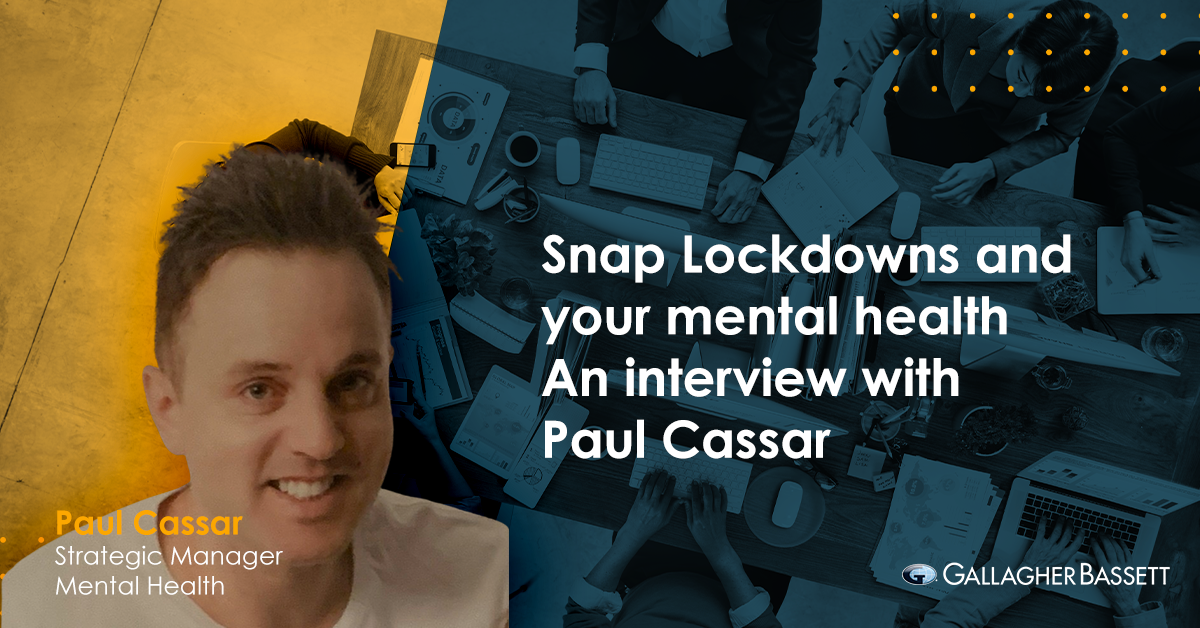Paul Cassar on snap lockdowns and your mental health

Over the last year, we have altered how we live and work due to COVID-19. Many employees understandably feel uneasy, uncertain, and disconnected as we continue to navigate our way through the virus.
Paul Cassar, GB's Mental Health Consultant, spoke about the importance of people looking after their mental health when snap lockdowns occur.
What have we learned about lockdown over the last 12 months?
In March 2020, we were in the early stages of the worldwide outbreak. We did not know how long the pandemic would last, most of us did not imagine that we would still be living the restricted lives we are. With cumulative lockdowns and pandemic-induced restrictions, we have now been living under a prolonged period of stress, loss and restrictions for more than a year so what have we learned so far…
Among the obvious and well-documented challenges, our time in lockdown has provided positive life lessons to help build a brighter future. My top four lockdown lessons:
A renewed sense of who we are. Enforced space from our self-induced routines has forced us to reflect on what makes us happy, how we want to live our lives, and what’s really important to us. Lockdowns have taught us that that routine can be dismantled and reassembled to build a more meaningful and for filling life.
Learning different ways to connect. Technology has played a part but technology can also be exhausting. What we have seen through lockdown is an ability to replace constant contact with meaningful and deliberate engagement which creates more space to reinvest time into other ventures.
The benefits of being bored. Noticed how many families are out riding bikes and walking around together. The benefits of a slower pace in the absence of all those activities create an opportunity to take stock and reflect on the risks of returning to over-scheduling and building a healthier work/life routine in future.
The gift of gratitude. Loss can provide a powerful lesson in appreciating what perhaps was taken for granted before lockdown. Gratitude is increasingly recognised as a powerful factor in promoting resilience and wellbeing, in children and adults alike. Learning to pay regular attention to what we have, rather than focusing on what we do not have, can inoculate us from negativity and promote optimism.
How can I help myself at home when snap lockdowns occur?
The two biggest tips I'd suggest would be to :
- Incorporate self-care activities into your routine. A daily walk or a virtual catch up, give your body and mind time to rest, reset, and rejuvenate. You don’t have to be productive at every single moment. Don’t feel bad for taking time to relax, reflect, or even have some fun. Self-care builds resilience and makes you more effective.
- Don’t be too hard on yourself. If the world has you feeling down, that’s natural. Trying to avoid negative feelings doesn’t usually work. Remember your feelings are valid.
Where to get mental health help during snap lockdowns?
Often the best place to start is by talking to your GP about what mental health services are available to you. We are fortunate that there are several mental health support services available in Australia that can be accessed in person, online, over the phone or via telehealth services.
Dedicated online and telephone support services have been established during the COVID-19 pandemic to ensure all Australians have access to mental health and wellbeing support.
Refer to GB article looking after your health and Wellbeing during Covid – 19 for useful links
Can a lockdown plan protect your mental health?
I certainly think they can, but I’d also suggest keeping it really simple. Life is already complex enough!
A simple lockdown approach should cover the 4 critical areas:
- Limit information and time on unhelpful media. Constant exposure to anxiety fuelling stories is never helpful
- Keep light exercise as part of your daily routine. Research shows that good physical health is critical for a healthy mind
- Keep connected
- And reach out for help if you’re concerned about yourself and others
What can organisations do to support their staff?
Whilst it’s always easy to pick out and focus on the negatives that need to be mitigated, it’s also important to make the most of the positives.
- I think it’s pivotal to take time to speak to each of your employees about their long-term working pattern preferences and support them to find one that works with their other commitments.
- Continually evaluate the impact of the current situation of your business and people. Status can change quickly, so we can't assume last week's resolution will fix this week's problem and most importantly….
- Start work now on the culture you want to have in place when the restrictions are lifted. What policies, plans and support would you need to provide to improve your employees’ work-life balance?
GB’s Injury Management team has a proven track record of reducing injury costs and minimising productivity losses for Australian businesses. Want to learn more about how GB’s Injury Management services can benefit your organisation? Find out more here
